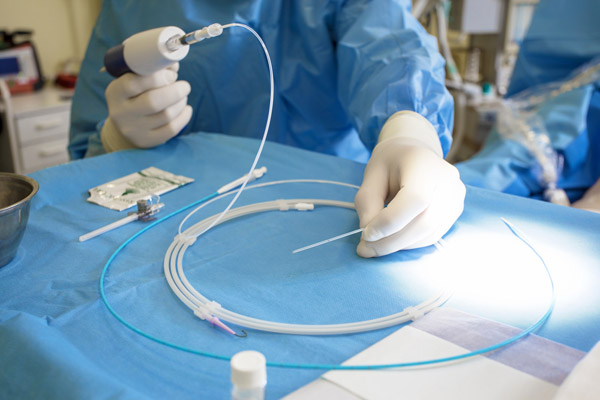Navigating Coronary Stent Placement: A Comprehensive Overview

Coronary stent placement is a treatment for coronary artery disease, a buildup of plaque (fat and cholesterol) around the heart's arteries. Along with angioplasty, a stent helps restore blood flow to the heart, relieving symptoms such as chest pain and shortness of breath and helping prevent a heart attack. The following overview of coronary stent placement should help you prepare and relieve any anxieties surrounding the procedure.
What is a coronary stent?
A stent is a small tube placed in the artery after an angioplasty to keep previously narrowed or blocked coronary arteries open. The stent is usually a mesh wire tube that stays in the artery permanently to help ensure proper blood flow to the heart. Coronary stents are often drug-eluting, meaning they are coated with medicine to help prevent the artery from narrowing. According to Johns Hopkins Medicine, coronary stent placement is part of nearly all angioplasty procedures.
Overview of procedure
The procedure is done under IV sedation and pain medication. However, the patient is usually awake during the procedure. The cardiologist inserts a catheter into the artery through the wrist or groin. Then, the doctor uses the catheter to insert the stent with a tiny balloon inside.
The doctor will use X-ray images to locate the narrowed or blocked artery. Contrast dye will make the arteries more visible. When the stent and balloon reach the narrowed or blocked artery, the cardiologist inflates the balloon to push the stent in place and support the newly opened artery. They then deflate and remove the balloon, leaving the stent in place.
Preparing for the procedure
The patient will be told not to eat or drink anything for 6 to 8 hours before the coronary stent placement procedure. The patient should inform the cardiologist of any medications they are taking, and the doctor will instruct the patient on how to handle them. The patient should arrange to have someone accompany them to the procedure and provide them with a ride home.
The cardiologist will give the patient detailed preparatory instructions specific to their procedure. Above all, the patient should relax; stent procedures are surprisingly common, and serious complications are rare. According to The Journal of the American Heart Association (JAHA), more than 600,000 coronary stent placements occur in the United States each year.
Aftercare and recovery
Recovery time varies by case and will be impacted by whether the patient had the catheter placed in the arm or groin area. The average hospital stay is under two days, and some people may not need to stay overnight. In general, a week is about what one can respect for recovery time, but patients should consult their cardiologist about how active they should be in the days after surgery. Patients with highly physical jobs may need to wait three to four weeks before returning to work.
The cardiologist will prescribe drugs to prevent blood clots in the stent, and the patient may need to take them for a month to several months. In addition, the patient will be provided with aftercare instructions and information on what to do if they suspect complications. Patients should call their doctor immediately if they experience fever or chills, chest pain, an abnormal pulse, dizziness, signs of infection, or numbness where the catheter was inserted.
Your heart health specialists
{{DBA}} is dedicated to preserving the heart health of all our patients. Our skilled team will keep you comfortable while you get the care that you need. If you have any further questions or concerns regarding coronary stent placement, call us today.
Request an appointment here:https://floridapremiercardio.com or call Florida Premier Cardiology at (561) 325-6495 for an appointment in our Delray Beach office.
Check out what others are saying about our services on Yelp: Coronary Stent Placement in Delray Beach, FL.
Recent Posts
Concerned about an upcoming coronary angioplasty treatment? Read on to learn more about this procedure. Coronary angioplasty treatment is used to improve blood flow to the heart and its structures. Your heart is one of the hardest working muscles in your body with over 100,000 beats per day.Your heartbeats power your cardiovascular system as it…
An echocardiogram, or EKG, provides cardiologists with a detailed view of how the heart beats and pumps blood, making it one of the most useful tools for evaluating heart health. This quick, noninvasive ultrasound test helps detect problems that may not appear on a routine exam or EKG. It also guides treatment decisions for many…
Varicose veins can cause discomfort, swelling, and visible changes that affect confidence and circulation. varicose vein treatment helps relieve these symptoms while improving overall vascular health. Advances in medical technology now allow cardiologists to offer effective, minimally invasive procedures that restore proper blood flow with little downtime. Understanding what to expect from varicose vein treatment…
Peripheral arterial disease can cause uncomfortable symptoms in the legs and, sometimes, the arms. Fortunately, a cardiologist can detect this condition early and provide personalized care to minimize the day-to-day impact. While being diagnosed with peripheral arterial disease may sound concerning, understanding exactly what it means and how to manage its symptoms can lead to…


